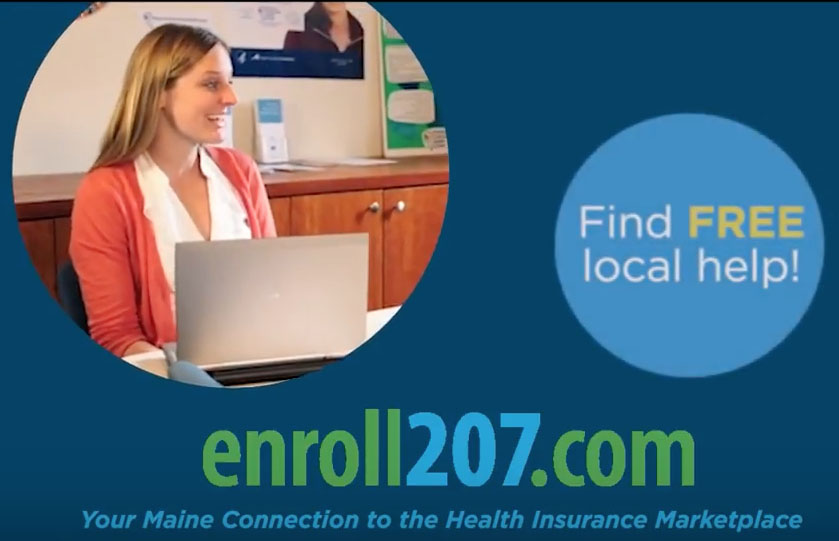The Trump administration’s decision to gut funding for Affordable Care Act outreach and advertising has left nonprofits contracted to do that work in Maine scrambling and wondering what happens next.
Ashley McCarthy, the health insurance navigator for Western Maine Community Action, which coordinates efforts across the state to help people sign up for the Affordable Care Act, said it’s difficult to think of the people who will end up without insurance.
“It was a complete shock,” McCarthy said of the news that emerged Friday. “It’s scary to think about all of the people that we’ve helped and what’s going to happen to them.”
Experts say enrollment will likely decline for 2018 because many people won’t be able to enroll without assistance and others will forget without being reminded through outreach efforts or advertising.
About 80,000 Mainers have ACA insurance – many of whom are self-employed or work part-time – and most receive subsidies to help pay the premiums.
Since the ACA marketplace went into effect in 2013, the uninsured rate has plummeted from 18 percent to 11 percent in 2016, according to Gallup polling. The uninsured rate has inched up to 11.7 percent through June 30 of this year, according to Gallup.
McCarthy said Western Maine Community Action heard about the cutbacks in the news, but it hasn’t received any information from the Trump administration about what will happen to the agency’s funding.
“We don’t know how it will affect us. We only know that it will,” McCarthy said.
ADVERTISING FACES 90 PERCENT CUT
The advertising budget by the federal government to help people sign up will be slashed by 90 percent, from $100 million to $10 million, while grants to nonprofits similar to Western Maine will be cut by 40 percent, from $63 million to $36 million, according to The New York Times. Health experts said the Trump administration is sabotaging the ACA for political purposes.
Trump administration officials argued that because the ACA is well-known, advertising can be cut back.
But Steve Butterfield, public policy director for Maine-based Consumers for Affordable Health Care, said advertising works and discontinuing it will hamper enrollment.
“You would never not advertise Coke simply because people know what Coke is,” Butterfield said.
Also, the health insurance marketplace’s open enrollment period was previously cut in half, so instead of a three-month period during which people could sign up, Nov. 1 to Jan. 31, those purchasing ACA insurance would have from Nov. 1 to Dec. 15 to sign up. As official health insurance navigators, Western Maine receives $521,000 in federal funding per year to station one to three navigators in nine locations around Maine.
“Last year we were able to help over 2,000 consumers across the state with enrollment assistance, general questions about the ACA and health literacy education,” McCarthy said.
McCarthy said they actually reach more people than they count, because they train volunteers to help people sign up for ACA insurance, and the advertising they do also reaches an undetermined number of people.
While people can sign up for ACA insurance independently, the navigators help enrollees work through the array of available plans and what can be a complicated and confusing experience. Many need help understanding premiums, deductibles and co-pays to decide what’s best for their financial and health situation.
For instance, a young and healthy person might choose a plan with high deductibles but lower premiums, while an older person with chronic conditions might pick a plan with higher premiums, generous coverage and lower deductibles.
Western Maine also does traditional and social media advertising to promote the ACA, McCarthy said.
The other federally designated navigator in Maine is the Maine Lobstermen’s Association, which has helped many in the fishing industry sign up for insurance. Patrice McCarron, the association’s executive director, declined to comment Friday.
The Maine Health Access Foundation, an Augusta-based nonprofit, had previously decided to end its independent ACA outreach efforts, but it reversed course after the Trump administration took over, said Barbara Leonard, the foundation’s president and CEO. The foundation did not receive federal money and used its own funds to promote ACA signups.
The foundation will spend about $200,000 on ACA outreach this year, which is “more limited” than in previous years, but is an improvement over the initial plan to not spend at all, Leonard said.
SHORTER ENROLLMENT PERIOD
“We’ll be focused on trying to get the word out that the ACA has not been repealed and that the marketplace is still open, though with a much shorter open enrollment period,” Leonard said. “We’ll be pulling the enroll207 website back out of mothballs to support that work.”
Consumers for Affordable Health Care, an Augusta nonprofit, assists people over the phone with ACA enrollment, but the organization only has nine employees, and ramping up ACA outreach efforts would be a “significant challenge,” said Emily Brostek, executive director. She said the Trump administration’s decision will potentially cause enrollment to decline.
“This move pulls the rug out from thousands of people in Maine,” Brostek said in a statement. “The Affordable Care Act is the law of the land. The Trump administration is responsible for implementing the law, and should be doing everything in its power to make it easy for people to get covered. Instead, they appear intent on making it harder.”
Efforts in Congress to repeal the ACA failed July 27 when Senate Democrats overwhelmingly voted against repealing it and were joined by Senate Republicans Susan Collins of Maine, Lisa Murkowski of Alaska and John McCain of Arizona.
Collins is slated to begin work next week on the Senate’s health, education, labor and pensions committee on a potential bipartisan compromise.
Joe Lawlor can be reached at 791-6376 or at:
jlawlor@pressherald.com
Twitter: joelawlorph
Send questions/comments to the editors.




Comments are no longer available on this story